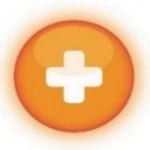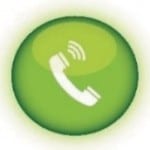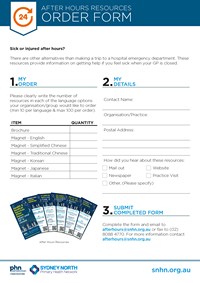
After Hours
Program Purpose
The Sydney North Health Network (SNHN) After Hours program is about improving access to primary health care in the after hours period so that people living in Sydney’s north can receive the right care, at the right time, in the right place.
After Hours Community Resources
- After Hours Information Brochure
- ENGLISH: After Hours Information
- SIMPLIFIED CHINESE: After Hours Information
- TRADITIONAL CHINESE: After Hours Information
- KOREAN: After Hours Information
- JAPANESE: After Hours Information
- ITALIAN: After Hours Information
- FARSI: After Hours Information
- TIBETAN: After Hours Information
- After Hours Poster
- After Hours Advertisement
After Hours Community Resources Form
To Order Your After Hours Resources CLICK HERE.
 Emergency+ Smartphone App
Emergency+ Smartphone App
Australia’s Triple Zero Awareness Working Group has developed a smartphone app for iOS, Android and Windows devices to:
- Provide the caller with information about when to call Triple Zero
- Provide the caller with information about who to call in various non-emergency situations
- State Emergency Service (SES) (132 500)
- Police Assistance Line (131 444)
- Crime Stoppers (1800 333 000)
- Health Direct Australia (1800 022 222)
- National Relay Service
- Assist the caller to dial the relevant number.
- Display the GPS coordinates of the phone’s location that the caller can read out to the emergency operator.
The app is free of charge and available for download from iTunes, Google Play and Windows Stores.
Click here for more information about this and other emergency-related apps.
After Hours Visiting Doctor Services
In the After Hours period you can phone for a home visiting doctor service that will visit you or a member of your family in your home. Some services offer bulk billing while others require a gap payment. Some Private Health Insurers may also provide a free GP-to-home service to their members.
| • National Home Doctor Service: | 13SICK |
| • Sydney Medical Service Co-operative Limited: | (02) 8724 6300 (or 1300HOMEGP) |
| • Palliative Care After Hours Helpline: | 1800 548 225 |
Sorry, Symptom Checker widget isn't available.
As part of our response to improving access to after hours services for the community, we are working with health professionals and services to better coordinate and connect services, including the flow of information between service providers, to improve health outcomes.
Better co-ordination between Primary Care, Emergency Departments and other services will all play a part in our efforts to build a stronger and more connected After Hours Health Network that aims to:
- Improve after hours primary care delivery
- Raise community awareness amongst priority groups including the elderly, CALD, parents with young children and adolescents on accessing after-hours services and what constitutes an “emergency”
- Reduce Emergency Department demand and reduce non-emergency hospital admissions.
How to access after hours medical services?
 Contact your GP or Pharmacist about their after hours arrangements. Your regular GP should be your first point of contact. If they are closed, a recorded message should provide contact details for their after hours service. Ask your GP to record the arrangements in your care plan.
Contact your GP or Pharmacist about their after hours arrangements. Your regular GP should be your first point of contact. If they are closed, a recorded message should provide contact details for their after hours service. Ask your GP to record the arrangements in your care plan.
 Visit www.findahealthservice.com.au to search for a local GP or Pharmacy open now. Our website allows you to easily “Find a Health Service” so that you can search for the closest doctor or pharmacy open now.
Visit www.findahealthservice.com.au to search for a local GP or Pharmacy open now. Our website allows you to easily “Find a Health Service” so that you can search for the closest doctor or pharmacy open now.
 For after hours health advice call Healthdirect on 1800 022 222 (24 hour helpline). Healthdirect Australia is a 24-hour telephone health advice line staffed by registered nurses to provide advice on any health issue and what to do next.
For after hours health advice call Healthdirect on 1800 022 222 (24 hour helpline). Healthdirect Australia is a 24-hour telephone health advice line staffed by registered nurses to provide advice on any health issue and what to do next.
Background
The After Hours strategic plan has been updated and expanded in 2015 to incorporate the Sydney north region. A recent meeting with key regional stakeholder groups including GPs, NSW Ambulance, Medical Deputising Services, Hospitals, Health Providers, Carer Support Services and the community agreed to deliver the following outcomes:
- Improved consumer after hours experience.
- Improved health professional experience.
- Improved consumer health outcomes.
- Reduced ED demand and avoidable hospitalisation.




